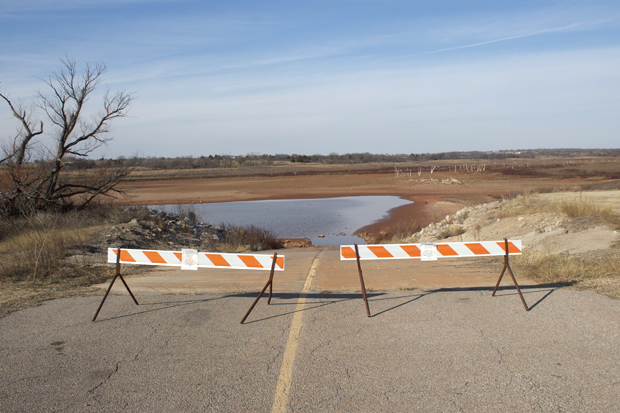Waurika Lake Gets New Life as Desperately Needed Rain Finally Falls
-
Logan Layden

Logan Layden / StateImpact Oklahoma
As is evidenced by this photo from January, Waurika Lake was dangerously low before the recent rains.
Before the consistent, heavy rains over the past week, Waurika Lake — the main source of water for Lawton and Duncan — was on the very brink of drying up too much to be used. Years of punishing drought led to the crisis, but what a difference a few days can make.
Now, the lake is 43 percent full, and rising. The Duncan Banner‘s Joel Dean talked to Waurika Water Conservancy District Director Dave Taylor about how much the recent rains have helped:
“If you think of the watershed as a tank and the tank sits at a higher level than the lake, that lake is going to empty until it runs out of water,” Taylor said. “The inflow continues to go between 5,000 and 6,000 cubic-feet per second which is pretty impressive.”
… “It is going to add about nine months to a year of water,” Taylor said. “When we started all this on Tuesday, the lake had about 53,000 acre-feet, now it has got 80,000 acre-feet, so the lake has added about 50 percent of its volume.”
Cities across southwest Oklahoma have enacted water restrictions to force residents to conserve during the drought, and those policies are also beginning to change. KSWO is already reporting that Lawton will move from Stage 3 water restrictions, which allowed for outdoor watering just two days a week, to Stage 1, a voluntary odd/even watering schedule:
“Even in the voluntary stage, the hope is that the citizens would still try and conserve as much as they can,” Assistant City Manager Jerry Ihler said.
Ihler says the hot, summer months are just ahead, so it’s not fair to say the drought is over just yet.
“Last year we lost about 20, 19 percent of our overall water supply during 2014, so we could be back in the same conditions next year,” Ihler said.
So, the city will continue to actively search for alternative water resources.
Lawton will also continue to move ahead with a project to dredge built-up silt off the bottom of Waurika Lake, which will allow the city to access more of the lake’s water. However, the lower the lake, the cheaper the dredging project. If it rains much more, Joel Dean reports the cost of the project could go up.
